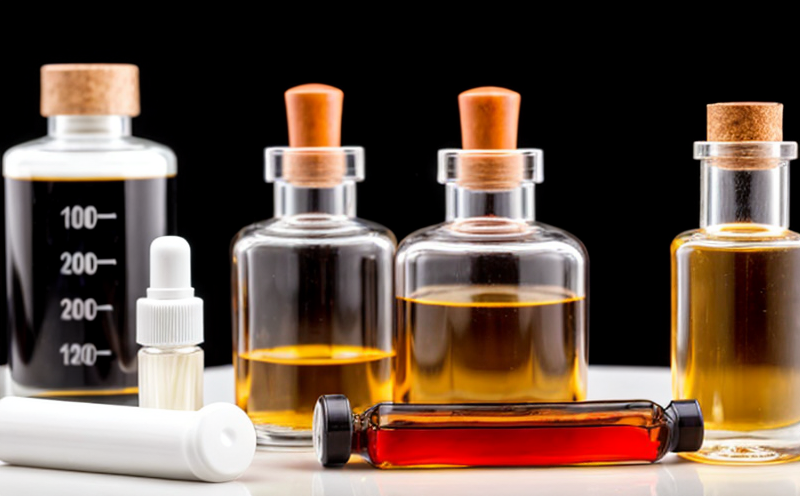Oral Suspension Stability Testing
In the pharmaceutical industry, oral suspensions are a critical dosage form used to deliver active ingredients more easily and effectively. Ensuring the stability of these formulations is paramount for maintaining product efficacy and patient safety. This service focuses on assessing the chemical and physical stability of oral suspensions over time. The primary objective is to ensure that the suspension remains consistent in its properties, ensuring accurate dosing and therapeutic outcomes.
The process involves a series of tests designed to evaluate how changes in temperature, humidity, light exposure, and storage conditions affect the suspension's stability. This testing helps manufacturers identify potential issues early on, allowing for corrective actions before the product reaches the market. By conducting these tests, we provide crucial data that supports regulatory submissions and ensures compliance with international standards.
The stability of an oral suspension can be compromised by several factors including particle aggregation, sedimentation, flocculation, and changes in viscosity. Our testing methods are designed to capture these changes accurately. For instance, laser diffraction is used to measure particle size distribution, while rheological analysis helps us understand the shear-thinning behavior of the suspension.
Another critical aspect of oral suspension stability testing is the evaluation of active ingredients over time. This involves monitoring the dissolution rate and bioavailability of the drug substance within the suspension. We use advanced analytical techniques such as high-performance liquid chromatography (HPLC) to quantify the amount of active ingredient present in each batch.
The results of our tests are reported comprehensively, providing detailed insights into the stability profile of the oral suspension. This includes data on particle size distribution, viscosity changes, sedimentation rates, and any other relevant parameters. The final report also includes recommendations for storage conditions to maintain product integrity post-production.
Our expertise in this area ensures that our clients receive reliable and actionable data, which is essential for maintaining high standards of quality and compliance. By leveraging advanced analytical techniques and a deep understanding of the pharmaceutical industry, we provide accurate and robust stability testing services.
Applied Standards
The oral suspension stability test adheres to several international standards that ensure accuracy and reliability in our results. The primary standard used is ISO 10359:2006, which provides guidelines for the evaluation of drug product stability over time. This standard covers various aspects such as temperature, humidity, light exposure, and storage conditions.
Another important standard that guides our testing process is ICH Q1A(R2), which specifies the requirements for chemical stability testing of new drug substances and products. This ensures that the oral suspension meets all regulatory requirements before being approved for clinical use or commercial sale.
The United States Pharmacopeia (USP) also provides specific tests related to the stability of oral suspensions, particularly in terms of particle size distribution and sedimentation rates. These guidelines are crucial for ensuring that the formulation remains consistent over time, which is critical for patient safety and efficacy.
By adhering to these standards, we ensure that our clients receive reliable data that can be used confidently during regulatory submissions and quality assurance processes. This compliance with international standards not only enhances trust but also ensures that products meet the highest quality benchmarks.
Customer Impact and Satisfaction
The impact of oral suspension stability testing on our customers is significant. By ensuring product consistency, we help pharmaceutical companies maintain regulatory compliance and enhance patient safety. Our detailed reports provide valuable insights into potential issues that can arise during the shelf life of the product, allowing for timely corrective actions.
Customers benefit from our comprehensive approach to stability testing, which includes not only chemical analysis but also physical characterization techniques. This holistic view ensures that all aspects of the formulation are thoroughly evaluated, leading to more robust and reliable products.
We have a proven track record of delivering high-quality results that meet or exceed regulatory expectations. Our clients often cite our expertise in stability testing as a key factor in their successful product launches. Feedback from satisfied customers highlights the importance of accurate data and timely reports, which are essential for navigating the complexities of the pharmaceutical industry.
Our commitment to customer satisfaction is reflected in our ongoing efforts to stay at the forefront of technological advancements in analytical methods. By incorporating the latest techniques into our testing protocols, we ensure that our clients receive the most up-to-date insights and recommendations. This dedication to excellence has earned us a reputation for providing exceptional service and support.
International Acceptance and Recognition
- ISO 10359:2006 – This international standard provides guidelines for the evaluation of drug product stability over time, including temperature, humidity, light exposure, and storage conditions.
- ICH Q1A(R2) – Specifies requirements for chemical stability testing of new drug substances and products to ensure regulatory compliance.
- USP 738 – Provides specific tests related to the stability of oral suspensions, particularly in terms of particle size distribution and sedimentation rates.
- European Pharmacopoeia (Ph. Eur.) – Offers detailed specifications for the quality control of pharmaceutical products, including stability testing protocols.
- PIC/S Guidelines – Provides good manufacturing practice guidelines that are internationally recognized as a benchmark for pharmaceutical production.
Our adherence to these standards ensures that our clients receive results that are widely accepted across different regulatory jurisdictions. This international recognition enhances the credibility of our testing services, making them a valuable asset in navigating global markets and ensuring consistent product quality.





